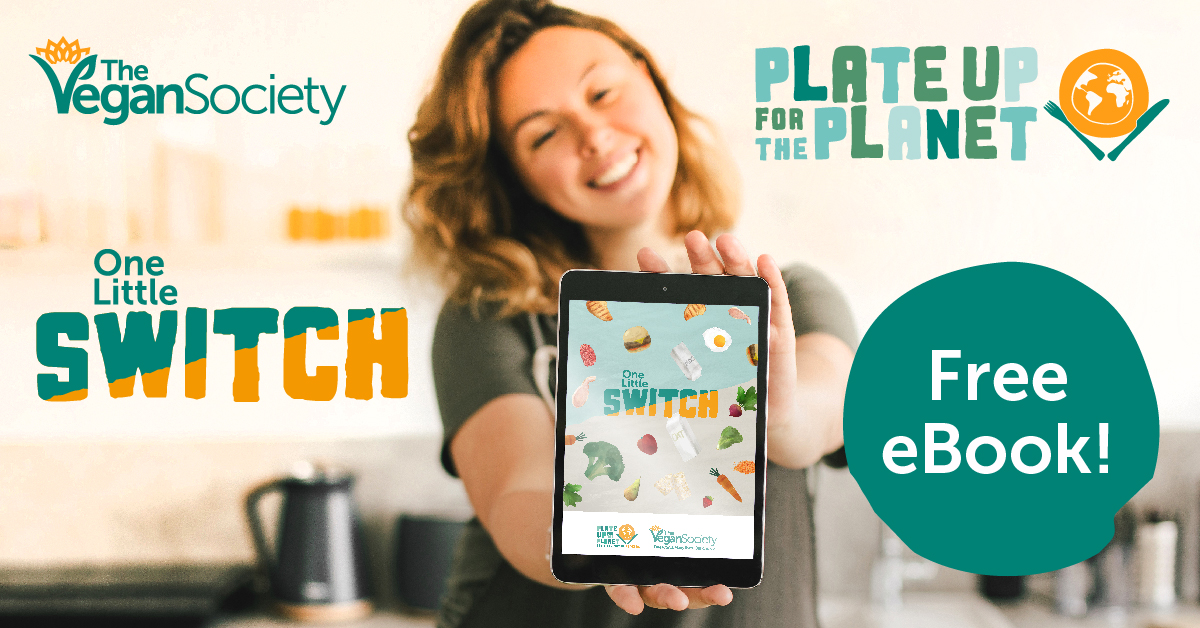With the climate emergency wreaking havoc across the globe, more people than ever are looking to make personal lifestyle changes for the greater good.

Altering your diet to one whose resources are less impactful on the planet is a simple way to lower your carbon footprint. According to research from the University of Oxford, moving from current diets to diets without animal products globally would mean a 28% reduction in global greenhouse gas emissions across all sectors of the economy [1]
The Vegan Society has relaunched its Plate up for the Planet campaign which aims to help environmentally conscious individuals make changes to their diet one step at a time, after research found a quarter of those open to considering a vegan diet said they don’t know where to start.
Swapping certain animal products, such as milk or chicken, is an easy way to introduce and experiment with vegan alternatives and make gradual and long-lasting changes to your diet. We've put together our top five vegan swaps, with help from food footprint consultant Foodsteps, to inspire your first steps to a planet-friendly diet.
1. Swap minced beef for lentils
If you're a fan of traditional comfort foods like cottage pie and spaghetti bolognese, replace the minced beef with protein-packed lentils for a simple, affordable and nutritious take on non-vegan classic dishes.
Compared to beef, per portion, lentils contribute approximately 0.011kg of carbon dioxide equivalents while beef comes in at 4.83kg – so this would save more than 400 times the emissions!
Beef has a particularly heavy-duty impact on the environment due to the land needed for grazing and to produce beef. Not to mention increased water use and methane emissions which, while shorter lived than carbon dioxide, has 28 times the impact on atmospheric temperature.
2. Swap chicken for tempeh
If chicken is your protein go-to, try swapping it for tempeh. This Indonesian delicacy is created from fermented soybeans pressed into a block to create a textured, high protein staple. As well as being packed full of B vitamins, calcium and iron, tempeh clocks up 0.16kg of CO2 equivalent per serving compared to chicken’s 1.17kg total.
Globally, poultry produces 790 million tonnes per year of CO2 equivalents, according to the FAO. This is mainly down to manure storage, handling and management as well as animal feed cultivation.
3. Swap from dairy milk to oat or soya alternatives.
There is a wealth of plant-based milks on the market with oat being among the most environmentally-friendly while soya, packs a decent protein punch. Most types of plant milk are fortified with essential nutrients including B12 and calcium.
Both oat and soya require just a fraction of land and water to grow, with the carbon dioxide equivalent of a standard serving weighing in at 0.15kg for oat and 0.21kg for soy. This is compared to 0.54kg for a serving of dairy milk.
4. Opt for a Moving Mountains Burger instead of beef burger
If you’re partial to a burger, there are a number of meat alternatives out there including the Vegan Trademark registered burger from plant-based brand Moving Mountains. The vegan alternative tastes just as good as a beef burger and is a good place to start for an easy oven dinner swap.
If that wasn’t convincing enough, the vegan burger’s foodprint is calculated at 0.35kg co2 equivalent, compared to the beef burger’s whopping 9.93kg contribution.
5. Switch from dairy chocolate peanuts to dark chocolate-coated
If you have a sweet-tooth and enjoy an after dinner (or even pre-dinner) treat, going vegan doesn’t mean you need miss out.
Vegan Trademark certified Doisy and Dam Dark Chocolate Peanuts are the perfect lightweight yet satisfying snack, coming in at 0.19kg co2 equivalents per serving. This compares with dairy chocolate peanuts at 0.23kg. While not a vast difference, buying alternatives drives demand for low-impact foods.
The Vegan Society's Campaign Manager Hannah Coyne said: "Following an environmentally-friendly diet is a lot easier than many people expect, especially when it's broken down into small steps. By following our campaign tips, ideas and recipes, swaps like these will become second nature and, ultimately, an easy, tasty and affordable way to minimise your carbon footprint."
Hopefully, our top five swaps have inspired you to take the first step on your plant-based journey. For further inspiration, you can download our free ebook which includes simple recipes, eco-friendly product swaps, growing your own fruit and veg and other tips to make your transition all the easier. Visit our campaign site for more information, research and ideas to help protect our planet.
[1]Poore, J and Nemecek, T 2019. Erratum for the Research Article “Reducing food’s environmental impacts through producers and consumers” SCIENCE Vol 363, Issue 6429 accessed online: DOI: 10.1126/science.aaw9908

